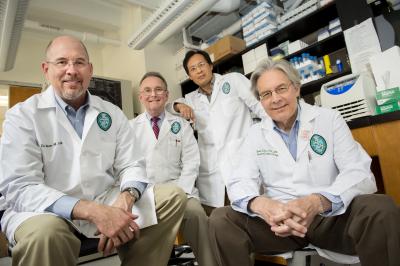Total darkness at night is key to success of breast cancer therapy — Tulane study

Principal investigators and co-leaders of Tulane's Circadian Cancer Biology Group, Steven Hill (left) and David Blask (right), and team members Robert Dauchy and Shulin Xiang. Credit: Photograph by Paula Burch-Celentano, Tulane University
The study, “Circadian and Melatonin Disruption by Exposure to Light at Night Drives Intrinsic Resistance to Tamoxifen Therapy in Breast Cancer,” published in the journal Cancer Research, is the first to show that melatonin is vital to the success of tamoxifen in treating breast cancer.
Principal investigators and co-leaders of Tulane's Circadian Cancer Biology Group, Steven Hill and David Blask, along with team members Robert Dauchy and Shulin Xiang, investigated the role of melatonin on the effectiveness of tamoxifen in combating human breast cancer cells implanted in rats.
“In the first phase of the study, we kept animals in a daily light/dark cycle of 12 hours of light followed by 12 hours of total darkness (melatonin is elevated during the dark phase) for several weeks,” says Hill. “In the second study, we exposed them to the same daily light/dark cycle; however, during the 12 hour dark phase, animals were exposed to extremely dim light at night (melatonin levels are suppressed), roughly equivalent to faint light coming under a door.”
Melatonin by itself delayed the formation of tumors and significantly slowed their growth but tamoxifen caused a dramatic regression of tumors in animals with either high nighttime levels of melatonin during complete darkness or those receiving melatonin supplementation during dim light at night exposure.
These findings have potentially enormous implications for women being treated with tamoxifen and also regularly exposed to light at night due to sleep problems, working night shifts or exposed to light from computer and TV screens.
“High melatonin levels at night put breast cancer cells to 'sleep' by turning off key growth mechanisms. These cells are vulnerable to tamoxifen. But when the lights are on and melatonin is suppressed, breast cancer cells 'wake up' and ignore tamoxifen,” Blask says.
The study could make light at night a new and serious risk factor for developing resistance to tamoxifen and other anticancer drugs and make the use of melatonin in combination with tamoxifen, administered at the optimal time of day or night, standard treatment for breast cancer patients.
Media Contact
More Information:
http://www.tulane.eduAll latest news from the category: Life Sciences and Chemistry
Articles and reports from the Life Sciences and chemistry area deal with applied and basic research into modern biology, chemistry and human medicine.
Valuable information can be found on a range of life sciences fields including bacteriology, biochemistry, bionics, bioinformatics, biophysics, biotechnology, genetics, geobotany, human biology, marine biology, microbiology, molecular biology, cellular biology, zoology, bioinorganic chemistry, microchemistry and environmental chemistry.
Newest articles

High-energy-density aqueous battery based on halogen multi-electron transfer
Traditional non-aqueous lithium-ion batteries have a high energy density, but their safety is compromised due to the flammable organic electrolytes they utilize. Aqueous batteries use water as the solvent for…

First-ever combined heart pump and pig kidney transplant
…gives new hope to patient with terminal illness. Surgeons at NYU Langone Health performed the first-ever combined mechanical heart pump and gene-edited pig kidney transplant surgery in a 54-year-old woman…

Biophysics: Testing how well biomarkers work
LMU researchers have developed a method to determine how reliably target proteins can be labeled using super-resolution fluorescence microscopy. Modern microscopy techniques make it possible to examine the inner workings…





















